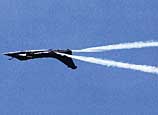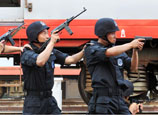
"Hindsight is 20/20," as the recent New York Times/CBS News polls regarding US foreign policy show. While the US public has wisely become more suspicious of most plans for US-led military action, it remains willing to accept the use of force against Iran, for many of the same reasons it initially accepted the Iraq conflict.
When asked if the US should continue to take the lead in military operations, approximately 60 percent of the respondents answered in the negative. This is in contrast to the polls taken on the eve of the Iraq War, which showed increasing support as the conflict drew closer, albeit with a number of fluctuations depending on how the question was phrased. However, the later progress of the Iraq conflict and occupation is likely one of the reasons for the decline in support for future open-ended commitments.
The Iraq and Afghanistan wars were both sold to the US public by claiming that they would be decisive, quick and inexpensive. That last became such an article of faith that Lawrence B. Lindsey, assistant to the president on economic policy, was forced to resign from his position in the Bush administration for suggesting that the total price for the Iraq War might reach $200 billion.
However, the US has seen the financial and human cost of both conflicts rise far beyond those initial and wildly optimistic estimates. And while a US withdrawal will reduce those ongoing costs, the US will be forced to continue to provide both nations with military aid for the foreseeable future.
Finally, neither conflict provided the unambiguous victory promised by its backers. Both Iraq and Afghanistan remain in some disorder, and it is an open question as to how viable either government will be in the long term.
In fact, instead of the proclamations that the Taliban would be forever driven from power that were heard in the early days of the invasion, British Foreign Secretary William Hague has recently stated his hopes that the Taliban will at some point sit down for peace negotiations. Needless to say, this is not the outcome that was initially predicted by the backers of regime change.
Additionally, it is now widely believed that the risks of both the Iraq and Afghanistan conflicts were deliberately concealed by the Bush administration. In Iraq at least, the case for war was drastically overstated, which had the effect of convincing the US people that not only were the risks small, but that the war was vital to US national security interests.
Because of this, the fact that the US people are in principle less eager to enter into yet another open-ended and US-led conflict is easy to understand. However, the poll results regarding Iran show that the US voters can still be exploited by interventionist rhetoric.
For Iran, the poll question "Would you favor or oppose the US taking military action against Iran in order to prevent them from producing a nuclear weapon?" makes two assumptions that are eerily similar to those made before the invasion of Iraq.
Firstly, it assumes that Iran is currently in the process of producing a nuclear weapon. The breathless comments about "red lines" and uranium processing are almost identical to the prewar predictions about Iraq's weapon of mass destruction forces. Secondly, the question not only assumes that military force would be necessary, but also implies that this force would be effective and decisive.
Of course, this is arrant nonsense. A military strike on Iran would almost certainly commit the US to long-term military operations within Iran, would lead to an end to international support for US-led sanctions, and would certainly lead to increased regional instability. It might in fact lead to the very thing it is supposed to stop, a decision on the part of Iran's leadership to develop and field nuclear weapons, regardless of the cost.
In fact, when poll questions also mention the possible long-term costs, public support for military action swiftly falls.
Ultimately, while the US public now seems to understand the risks of following the neocon strategy, it must be certain to apply those lessons to future conflicts.
Only by remaining wary of one-sided and misleading information and working to ensure that the US government understands that the people remain opposed to unwise and open-ended military commitments can we avoid a repetition of the neocon dream that became a US nightmare.
The author is a freelance writer based in Corona, California. charlesgray109@gmail.com
















 Sweating at Yoga club: white collars' new choice after work
Sweating at Yoga club: white collars' new choice after work


![]()
